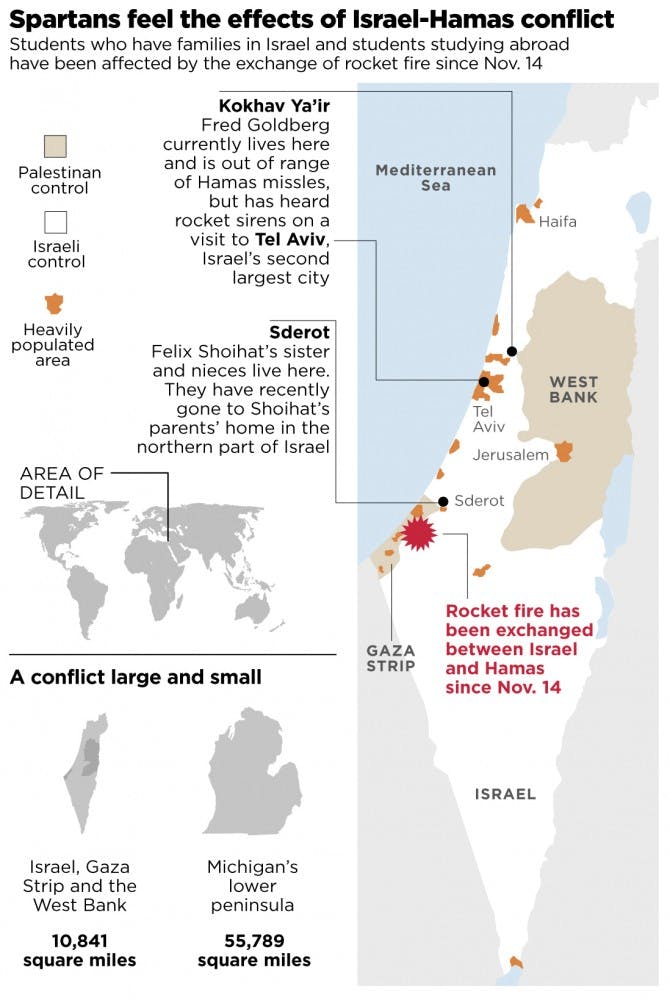It’s hit and miss.
Skyping with his worried mother on Sunday from the kitchen of his Kokhav Ya’ir home, located in central Israel, Fred Goldberg felt quite safe.

It’s hit and miss.
Skyping with his worried mother on Sunday from the kitchen of his Kokhav Ya’ir home, located in central Israel, Fred Goldberg felt quite safe.
But when the political science senior drove about 30 miles south toward Tel Aviv last Friday, he heard the rocket warning sirens and “Code Red” radio announcements.
He and his friends in the car knew the drill: head home right away or face the chance of falling victim to deadly Hamas rockets, he said on a Skype call from Israel.
After four years of strained cease fire, the Israeli-Palestinian conflict turned on Nov. 14 when Israel commenced a large-scale air assault against Hamas, the political leadership in the Gaza Strip, after the south part of the country was bombarded by rockets from militant groups in the Gaza Strip for several months.
According to The New York Times, Hamas fired rockets near Tel Aviv and Jerusalem on Friday in response. This surprised many because Jerusalem is a holy city for Jews, Muslims and Christians.
Arabic and comparative cultures and politics senior Angelina Mosher, who is a member of Students Allied for Freedom and Equality, or SAFE, a Palestinian student activist group at MSU, said she sympathizes with Israel, but there is a fundamental problem with its government, as most of their policies and political strategy are based on fear and self-defense.
Mosher visited the West Bank last summer and said the trip was her beginning of understanding the conflict.
She hopes other students also will choose to educate themselves about the conflict before taking sides.
“Don’t be quick to make assumptions; don’t be quick to think Palestinians are terrorists or they are just violent people,” Mosher said.
Students on campus with ties to both sides of the conflict only can watch from thousands of miles away as the nations are under attack.
This is the most severe conflict since Cast Lead, an Israeli ground invasion into the Gaza Strip in 2008, which left the nation in an unpopular stance internationally, killing about 1,400 Gazans. Goldberg was a member of the Israeli army during the invasion.
Cindy Chalou, associate director for the MSU Office of Study Abroad, said there currently are two students studying abroad in Israel, including Goldberg. There are no students studying abroad in Palestinian territories.
The office is not giving the students specific directions to take shelter or return to the U.S., but has been in contact with them to make sure they are safe, Chalou said.
As Israel and Hamas inch closer and closer to a possible full-on war, it has hit home for many at MSU who have ties to the area.
Kenneth Waltzer, the director of the Jewish Studies Program at MSU, said although tensions have escalated within the past week, there is a chance with pressure from Egypt and the U.S. that the two sides could agree again to a cease-fire.
But, Waltzer said it also is possible that an agreement will not be reached, and Israel will have to choose whether or not it will initiate a ground invasion into the Gaza Strip.
Waltzer said he’s not sure when this decision will be reached.
“Israel doesn’t want to send in (ground) forces into Gaza. There will be a tremendous loss of life, it will be very costly to Israel (and) nobody wants that,” Waltzer said.
The Israeli Cabinet has allowed the Israeli military to call in up to 75,000 reserve troops for a possible ground invasion in the Gaza Strip.
Support student media! Please consider donating to The State News and help fund the future of journalism.
This has Goldberg worried, as he is a member of the reserves, and although he has not been called, a family member of his has.
International relations senior and SAFE President Chris Burnett hopes the Israeli government won’t call upon all of these troops.
“I feel like Israel’s attack on Gaza was unfounded because there had been a truce and Israel was the one that broke it,” Burnett said.
“I hope that Israel won’t invade and there will be a de-escalation, but I’m not optimistic.”
As the conflicts have been ongoing for many years, citizens have learned to cope with the state of uncertainly and worry, said Israel native Felix Shoihat, an Israel fellow at MSU Hillel Jewish Student Center.
Shoihat has been at MSU Hillel for about a year and a half and had family in Sderot, “one of the most bombarded cities” located in southern Israel. Since the assaults have escalated, his sister and nieces went to his parents’ home in northern Israel for the weekend, thankfully a much safer location, he said.
“My nieces were born into the situation. … This is pretty much what they know: the sounds of the rockets and the rockets falling down and spending nights in bomb shelters and evacuating the city at least a couple of times a year,” Shoihat said.